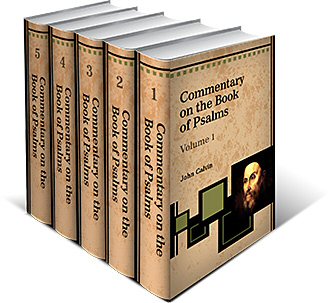 The 63rd Q/A of the Heidelberg Catechism deals with Scripture’s promise tthat God will reward the good that his people do. The catechism says “This reward is not earned; it is a gift of grace.” Here’s Calvin’s similar take on this theme found in his commentary on Psalm 62:12b, You reward everyone according to what they have done (NIV).
The 63rd Q/A of the Heidelberg Catechism deals with Scripture’s promise tthat God will reward the good that his people do. The catechism says “This reward is not earned; it is a gift of grace.” Here’s Calvin’s similar take on this theme found in his commentary on Psalm 62:12b, You reward everyone according to what they have done (NIV).From this, and passages of a similar kind, the Papists have argued, in defense of their doctrine, that justification and salvation depend upon good works; but I have already exposed the fallacy of their reasoning. No sooner is mention made of works, than they catch at the expression, as amounting to a statement that God rewards men upon the ground of merit.
It is with a very different design than to encourage any such opinion, that the Spirit promises a reward to our works—it is to animate us in the ways of obedience, and not to inflame that impious self-confidence which cuts up salvation by the very roots.
According to the judgment which God forms of the works of the believer, their worth and valuation depend, first, upon the free pardon extended to him as a sinner, and by which he becomes reconciled to God; and, next, upon the divine condescension and indulgence which accepts his services, notwithstanding all their imperfections.
We know that there is none of our works which, in the sight of God, can be accounted perfect or pure, and without taint of sin. Any recompense they meet with must therefore be traced entirely to his goodness. Since the Scriptures promise a reward to the saints, with the sole intention of stimulating their minds, and encouraging them in the divine warfare, and not with the remotest design of derogating from the mercy of God, it is absurd in the Papists to allege that they, in any sense, merit what is bestowed upon them.
Shane Lems


“In this sense we shall concede not only a partial righteousness in works, as our adversaries themselves hold, but also that it is approved by God as if it were whole and perfect. But if we recall the foundation that supports it, every difficulty will be solved. A work begins to be acceptable only when it is undertaken with pardon. Now whence does this pardon arise, save that God contemplates us and our all in Christ? Therefore, as we ourselves, when we have been engrafted in Christ, are righteous in God’s sight because our iniquities are covered by Christ’s sinlessness, so our works are righteous and are thus regarded because whatever fault is otherwise in them is buried in Christ’s purity, and is not charged to our account. Accordingly, we can deservedly say that by faith alone not only we ourselves but our works as well are justified.”
John Calvin, Institutes, 3.17.10.
LikeLiked by 1 person
Very good, and Amen!
LikeLike
Continue to post great and informative biblical and historical articles, I run to this daily since I found the site,.. Truly a blessing to see the historical church thrive in the 21st century. SDG.
LikeLiked by 1 person